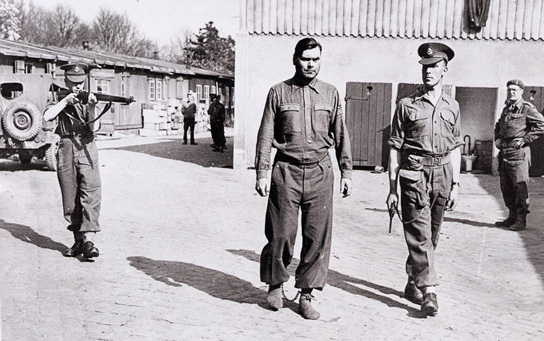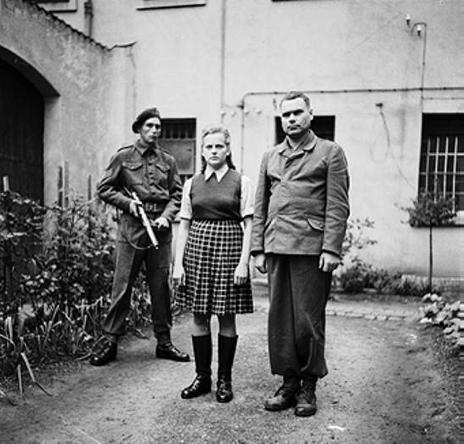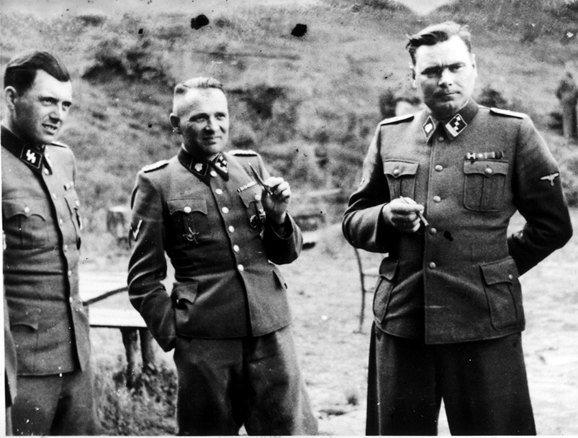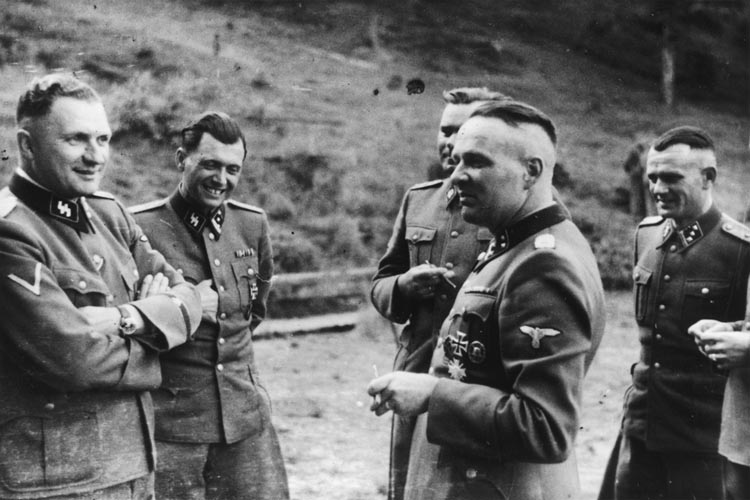
Commandant Josef Kramer arrested by the British at Belsen.
Josef Kramer
[back] Eye Witnesses
[back] Belsen
[back] Auschwitz-Birkenau
[Captured by British forces on April 17 and interned on the following day. Sometime between April 18 and May 21 Kramer made a first statement on his role as camp commandant. In it, we read: "I have heard of the allegations of former prisoners in Auschwitz referring to a gas chamber there, the mass executions and whippings, the cruelty of the guards employed and that all this took place either in my presence or with my knowledge. All I can say to all this is that it is untrue from beginning to end."1]
The Lethal Liberation of Bergen-Belsen by Joseph Bellinger
[1995] Bergen-Belsen Camp: The suppressed story By Mark Weber
See commandants: Richard Baer Rudolf Hoess Franz Stangl Irmfried Eberl
Quotes
Josef Kramer (b. 1906) was the commandant of Birkenau
from May to December 1944. In a lengthy statement made by Kramer to his
British captors on May 22, 1945, he explicitly denied the existence of gas
chambers at Birkenau. Kramer was sentenced to death at a trial concerning
his time as commandant of the Bergen-Belsen camp. He was hanged on December
13, 1945. A Brief List of the Conveniently Deceased by Thomas Kues
Kramer's clear conscience is also suggested by the fact that he made no effort to save his life by fleeing, but instead calmly awaited the approaching British forces, naively confident of decent treatment. "When Belsen Camp was eventually taken over by the Allies," he later stated, "I was quite satisfied that I had done all I possibly could under the circumstances to remedy the conditions in the camp." (note 19) [1995] Bergen-Belsen Camp: The suppressed story By Mark Weber
Commandant Kramer, who was vilified in the British and American press as "The Beast of Belsen" and "The Monster of Belsen," was put on trial and then executed, along with chief physician Dr. Fritz Klein and other camp officials. At his trial, Kramer's defense attorney, Major T.C.M. Winwood, predicted: "When the curtain finally rings down on this stage Josef Kramer will, in my submission, stand forth not as 'The Beast of Belsen' but as 'The Scapegoat of Belsen'." (note 24) [1995] Bergen-Belsen Camp: The suppressed story By Mark Weber
Barton made inquiries with inmates, including Jewish doctors, who told him that Belsen had not been too bad until the autumn of 1944. Then, as the Russian armies were advancing, they said they had been given the choice of remaining in the camps about to be overrun by the Soviets or being repatriated back to Germany. Many chose to return to Germany. As a result, from the autumn of 1944 to early 1945, some 53,000 people were moved into Belsen, which had room for only 3,000 inmates. The overcrowding was gross and the staff at the camp resented it. Josef Kramer, the commandant of Belsen, felt he had a responsibility to his 3,000 inmates but was apparently angry about the 53,000 that were dumped into the camp. Dr. Klein, the medical doctor at the camp, didn't know what to do. (21-5162, 5163) [Dr. Russell Barton] The 'False News' Trial of Ernst Zündel -- 1988

Commandant Josef Kramer arrested by the British at Belsen.

Irma Grese and Josef Kramer standing in the
courtyard of the Prisoner of War cage at Celle. Kramer said that the gas chamber
story was “untrue from beginning to end.” Both were convicted of war crimes and
sentenced to death. Aug. 8, 1945. Source Imperial War Museum collection:
unrestricted access.

Dr. Josef Mengele,
Rudolf Hoess and Josef Kramer
(see:
Auschwitz-Birkenau)

Richard Bär, Josef Mengele, Josef Kramer,Rudolf Höss